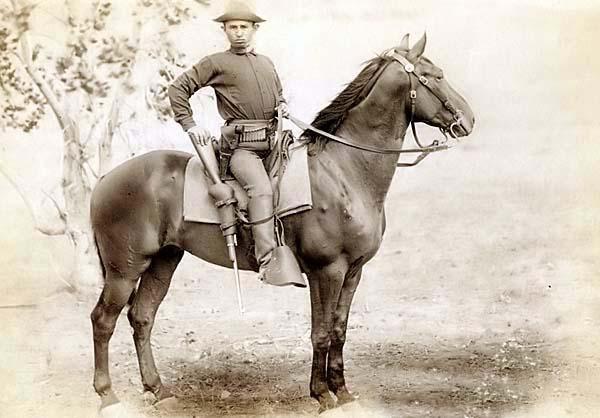
There were stretches of country picturesque to look upon and capable of cultivation, especially with irrigation; and other expanses not a bit more fertile than so many brick-yards, where all was desolation, the home of the cactus and the coyote. Arizona was in those days separated from “God’s country” by a space of more than fifteen hundred miles, without a railroad, and the officer or soldier who once got out there rarely returned for years.
During this campaign we were often obliged to leave the warm valleys in the morning and climb to the higher altitudes and go into bivouac upon summits where the snow was hip deep, as on the Matitzal (sic), the Mogollon plateau, and the Sierra Ancha. To add to the discomfort, the pine was so thoroughly soaked through with snow and rain it would not burn, and unless cedar could be found the command was in bad luck. -Captain John G. Bourke, “On the Border With Crook”
In the years following the Civil War the Frontier Army was charged with the thankless task of keeping the peace in the West. That meant not only protecting the whites from the Indians but protecting the Indians from the whites. Playing peacemaker, the Army was caught between a rock and a hard place. There were some 2,600 soldiers to police about 200,000 Indians. Many times the natives were better armed than the soldiers. The Army was also caught in the middle between eastern politicians and activists who believed the Army was too harsh in its treatment of Indians and the westerners who insisted the Army mollycoddled the natives.
Deaths resulting from such diseases as cholera, yellow fever killed far more than those resulting from fighting Indians. Between the years 1860-1886, 1,993 soldiers were killed or wounded in the Indian Wars. In 1886, 1,217 soldiers died from cholera alone.
Harsh living conditions, fatigue, poor pay, poor rations, and little appreciation from his fellow countrymen were the grim prospects the soldiers faced. They were often sent into battle with obsolete weapons and equipment as well as under strength in numbers. Desertion, alcoholism and suicide rates were high on the isolated military posts. Loneliness and boredom were the soldier’s constant companion. Typical meals on the posts consisted of such culinary delights as beef hash, dry bread, and coffee for breakfast, followed by a lunch of sliced beef, dry bread and coffee. Evening meals were just simply bread and coffee.
Punishment was harsh especially for acts such as drunkenness and desertion.
Yet these men became good soldiers. Under the professionalism of the corps of officers and non-commissioned officers, along with the rigid discipline instilled, the small Spartan army made up largely of Irish and German immigrants became veteran, reliable and even efficient. It was admired and understood by foreign military observers who ventured West to observe them.





